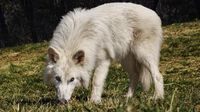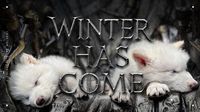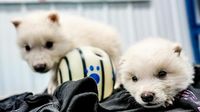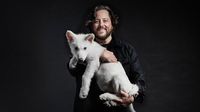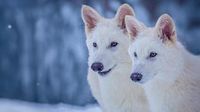Colossal Biosciences, a Dallas-based biotech company, has made headlines with its groundbreaking announcement on April 7, 2025, revealing the successful birth of three dire wolf pups, marking the first time this long-extinct species has been brought back to life. The dire wolf, which roamed the Americas over 12,500 years ago, has been immortalized in popular culture, especially through the hit series "Game of Thrones." Now, thanks to advanced genetic engineering, these majestic creatures are once again part of our world.
Colossal CEO Ben Lamm expressed his pride in the achievement, stating, "Our team took DNA from a 13,000-year-old tooth and a 72,000-year-old skull and made healthy dire wolf puppies. It was once said, 'any sufficiently advanced technology is indistinguishable from magic.' Today, our team gets to unveil some of the magic they are working on and its broader impact on conservation." The company has named the pups Romulus and Remus, after the legendary founders of Rome, and the female Khaleesi, a nod to the beloved character from the series.
To achieve this remarkable feat, Colossal's scientists extracted DNA from two fossils: a tooth discovered in Sheridan Pit, Ohio, and an inner ear bone from American Falls, Idaho. Following the extraction, the team sequenced the ancient DNA to identify specific gene variants that would characterize the dire wolf. They found that these wolves were approximately 25% larger than modern gray wolves, with a wider head, stronger jaw, and a distinctive white coat.
Using advanced gene-editing techniques, the team performed 20 precise edits to a donor genome taken from the gray wolf, the dire wolf's closest living relative. This process involved multiplex gene editing, which allowed them to introduce ancient variants into the genome while ensuring the health and viability of the resulting embryos. The embryos were then implanted into the wombs of large domestic dog mixes, who served as surrogates for the dire wolf pups.
The pups are currently thriving on a 2,000-acre ecological preserve that has been certified by the American Humane Society. This secure environment is designed to provide lifetime care and protection for the wolves, which are monitored by a dedicated team of 10 animal care staff. The preserve is enclosed by 10-foot-tall, zoo-grade fencing, ensuring the safety and well-being of the animals.
Colossal's efforts extend beyond the dire wolf. The company has also successfully cloned two litters of red wolves, the most critically endangered wolf species in the world. These litters include one adolescent female named Hope and three male pups named Blaze, Cinder, and Ash. This cloning initiative aims to increase genetic diversity within the red wolf population, which is crucial for their survival.
Colossal's innovative approach to cloning involves the use of endothelial progenitor cells (EPCs) harvested from the bloodstreams of living gray wolves. This technique is less invasive than traditional cloning methods, which often require tissue samples. By isolating EPCs, the team can create genetically edited cells that express the desired traits of the dire wolf without causing harm to the donor animals.
As part of their mission to restore extinct species, Colossal is also working on plans to bring back the woolly mammoth by 2028, utilizing similar gene-editing techniques on Asian elephants. The company has already produced a "woolly mouse" by editing genes in laboratory mice to resemble the characteristics of the ancient mammoth. In March 2025, Colossal announced the successful birth of 38 woolly mouse pups, demonstrating the feasibility of their methods.
Colossal has garnered significant attention and investment, raising $435 million from notable backers, including filmmaker Peter Jackson and "Game of Thrones" creator George R.R. Martin. Martin, who has become a cultural advisor and investor in Colossal, expressed his excitement about the project, stating, "Many people view dire wolves as mythical creatures that only exist in a fantasy world, but in reality, they have a rich history of contributing to the American ecosystem." He even visited the preserve and was moved to tears upon meeting the newly born dire wolves.
Despite the excitement surrounding Colossal's achievements, the company faces skepticism from some scientists regarding the ethics and practicality of de-extinction efforts. Critics question the potential consequences of reintroducing extinct species into modern ecosystems and the implications for existing wildlife. However, Colossal remains focused on its goals, emphasizing the importance of conservation and biodiversity.
Looking ahead, Colossal plans to secure ecological preserves for the dire wolf on indigenous lands in North America, aiming to restore these animals as a viable species. They believe that the same technologies used to resurrect the dire wolf can also aid in the conservation of endangered species, ultimately contributing to the health of ecosystems.
As Romulus, Remus, and Khaleesi grow and thrive, they represent not only a scientific achievement but also a symbol of hope for the future of conservation. Colossal's work has the potential to reshape our understanding of extinction and the possibilities of genetic science, paving the way for a new era of biodiversity.
